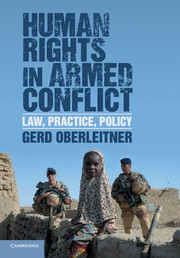Book contents
- Frontmatter
- Contents
- Acknowledgments
- Table of cases
- Table of Legal Instruments
- List of Abbreviations
- Introduction
- Part I Human rights in armed conflict: history of an idea
- Part II Human rights and humanitarian law: theory
- Part III Human rights and humanitarian law: challenges and commonalities
- 8 The right to life: the limits of human rights in armed conflict?
- 9 The extra-territorial application of human rights: functional universality
- 10 War as emergency: derogation
- 11 Human rights and humanitarian obligations
- 12 Operationalizing human rights in armed conflict
- Part IV The dynamics of war and law
- Part V Enforcement: practice and potential
- Conclusion
- Bibliography
- Index
- References
10 - War as emergency: derogation
Published online by Cambridge University Press: 05 March 2015
- Frontmatter
- Contents
- Acknowledgments
- Table of cases
- Table of Legal Instruments
- List of Abbreviations
- Introduction
- Part I Human rights in armed conflict: history of an idea
- Part II Human rights and humanitarian law: theory
- Part III Human rights and humanitarian law: challenges and commonalities
- 8 The right to life: the limits of human rights in armed conflict?
- 9 The extra-territorial application of human rights: functional universality
- 10 War as emergency: derogation
- 11 Human rights and humanitarian obligations
- 12 Operationalizing human rights in armed conflict
- Part IV The dynamics of war and law
- Part V Enforcement: practice and potential
- Conclusion
- Bibliography
- Index
- References
Summary
The idea and law of derogation
Under international human rights law, derogation allows certain human rights to be temporarily suspended in light of national emergency situations which may include armed conflicts. Such derogation provisions can be found in the International Covenant on Civil and Political Rights (ICCPR), the European Convention on Human Rights (ECHR) and the American Convention on Human Rights (ACHR). They seem to reflect the idea of a defence of necessity in international law and transpose it into human rights law. They are escape clauses which allow states, in an allegedly “realistic” perspective, to suspend human rights so as not to be unduly restricted in defending their very existence. Their message is that, when things really go wrong, there is still a way out, as states are not bound to adhere to human rights obligations if this means committing “state suicide.”
What seems to reflect common sense is, however, difficult to capture as a legal phenomenon. Derogation clauses, as well as the whole idea of derogation remain opaque in international legal and international relations scholarship. They function in a complex matrix of concerns to guarantee human rights as inherent entitlements and protect citizens and domestic institutions effectively in situations of violence, while at the same time securing the stability and existence of the state and its institutions. Infringements of certain rights, particularly civil liberties as understood in domestic legal systems, were seen as acceptable under strict limits so as to ensure the overall functioning and survival of state and society. “Fundamental” liberties, such as the prohibition of torture and the right to life, were deemed as sacrosanct while other, seemingly less important, rights could be derogated. Derogation remains a paradox for the way it allows the suspension of rights precisely in times when they are most needed. The way in which states deal with the human rights obligations in situations of crisis can be seen as the acid test for their commitment, given that it is precisely in such situations where human rights protection against abusive and overreacting security forces in defence of a state apparatus under threat becomes important.
- Type
- Chapter
- Information
- Human Rights in Armed ConflictLaw, Practice, Policy, pp. 169 - 175Publisher: Cambridge University PressPrint publication year: 2015

